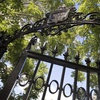{shortcode-a87e19633c78e48da16b2626da4200a674b43e66}
Harvard intended to publish the long-awaited reports of its task forces on combating antisemitism and Islamophobia in early April but delayed their public release, four people familiar with the matter said.
The delay came as the Trump administration escalated its pressure campaign against Harvard, demanding that the University accept a set of sweeping conditions to keep more than $8 billion in federal funding.
The reports were first scheduled to be released last fall. After issuing preliminary recommendations in June, neither task force has released an update on the status of their work — a delay that Harvard’s top critics in Washington have noted.
A person briefed on the matter said the final report on antisemitism went through several drafting stages before being completed by late March and has not been changed substantially since.
The report, which spans approximately 100,000 words, includes multiple pages recounting anecdotes of affiliates facing antisemitism at Harvard, the person said. The report also recounts a history of antisemitism at Harvard and analyzes how the Harvard College Administrative Board has handled antisemitism complaints.
The reports were distributed to deans and senior administrators to verify the descriptions of incidents included in the reports, according to four people with knowledge of the matter.
In a letter to Harvard President Alan M. Garber ’76 on Saturday, the Department of Health and Human Services demanded that Harvard turn over all drafts of reports and findings from all of its task forces, explicitly naming the two presidential task forces on combating antisemitism and Islamophobia.
In a Monday message to Harvard affiliates announcing that the University had sued the White House, Garber pledged to release the reports “soon” in what seemed to be a response to the HHS’ demands from two days before.
“The reports are hard-hitting and painful,” Garber wrote. “We believe adoption of the recommendations and other measures will go far toward eradicating those evils on our campus.”
A Harvard spokesperson referred to Garber’s statement but declined to comment further.
In their preliminary findings released in June, the task forces found that both pro-Palestine and pro-Israel students reported facing harassment and discrimination. The Islamophobia task force recommended that the University fund a visiting professorship in Palestinian studies, and both groups urged Harvard to take steps to address discrimination against students.
Several of the initial recommendations have already been implemented.
Last July, Harvard standardized the fact-finding process used in disciplinary cases across the University after the antisemitism task force urged Harvard to address “significant disparities across units” in their handling of such cases. A month later, Harvard University Dining Services introduced hot kosher lunches to undergraduate dining halls.
But the June recommendations drew quick criticism from top House Republicans. In a July letter to Garber, nearly 30 House Republicans — including Rep. Elise M. Stefanik ’06 (R-N.Y.), one of Harvard’s fiercest critics in Congress — accused the task forces of taking “six months to reinvent the wheel.”
—Staff writer Caroline G. Hennigan contributed reporting.
—Staff writer Matan H. Josephy can be reached at matan.josephy@thecrimson.com. Follow him on X @matanjosephy.
—Staff writer William C. Mao can be reached at william.mao@thecrimson.com. Follow him on X @williamcmao.
—Staff writer Dhruv T. Patel can be reached at dhruv.patel@thecrimson.com. Follow him on X @dhruvtkpatel.
—Staff writer Veronica H. Paulus can be reached at veronica.paulus@thecrimson.com. Follow her on X @VeronicaHPaulus.
Read more in News
Young Americans Oppose Trump, Report Economic Hardship in New IOP Poll












